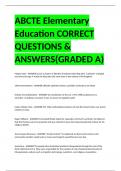Exam (elaborations)
ABCTE Elementary Education CORRECT QUESTIONS & ANSWERS(GRADED A)
- Course
- Institution
Magna Carta - ANSWER (1215) a charter of liberties (freedoms) that King John "Lackland" of Englad was forced to sign; it made the king obey the same laws as the citizens of his kingdom 13th Ammendment - ANSWER officially abolished slavery, prohibits involuntary servitude. Articles of Confeder...
[Show more]



